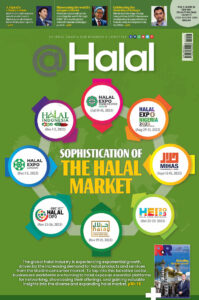Food and diet in the halalan toyyiban concept are not only about being permissible in Shari’ah, but they must also be good and beneficial to people.
The toyyiban aspect of the diet ensures the quality and safety of food, thus emphasising
mindful and healthy food consumption. Therefore, taking halal food without concerning the toyyib elements can have fatal consequences.
Exciting research done in Turkey demonstrated that a region in the brain responsible for decision making, called the ventromedial frontal cortex, increased its activity when halal food images were presented. The study proved that Muslims are concerned and sensitive about the halal status of food they eat. While this virtue may be sufficient to avoid the religious prohibition cautiously, the concern must also extend to ensuring the toyyib value of food by considering its effects on health.
Food consumption and eating behaviour directly affect the body’s health, including the brain, the most critical organ of the human body. The brain and the nervous system receive, interpret and send signals throughout the body, thus coordinating body movement and controlling body function. Every process that regulates the body, including thought, memory, emotion, touch, motor skills, vision, breathing, temperature, and even hunger, are controlled by this complex organ.
Toyyib and healthy diet is vital for the brain
The body cannot produce some nutrients, thus it must come from the diet. Food intake can affect the multiple processes of the brain and thus influence brain function. Complex carbohydrates found in whole grains, beans and vegetables provide excellent energy sources for the brain. At the same time, high-quality protein is the source of amino acid required to produce neurotransmitters for brain communication.
Scientific evidence on several specific dietary components such as omega-3 fatty acids, flavonoids, vitamins B, D, and E, and choline showed positive effects on cognition, possibly by improving the communication of brain cells. The cognitive function involves conscious intellectual activity, for example, thinking, remembering, and reasoning. Fatty fish is an excellent source of Omega-3 fatty acids and vitamin D.
Brain cells require a considerable amount of oxygen to operate and are thus, exposed to oxidative stress. The waste after oxygen is used oxidative stress, which can cause harm to the brain cell. Fruits and vegetables are rich in antioxidants, vitamins, and minerals that are crucial to nourishing and protecting the brain. ‘Prophetic food’ such as dates, honey, figs, and black seeds are also filled with this nutritious goodness.
A balanced diet must accompany healthy food consumption. A healthy eating pattern such as the Mediterranean diet, low in fat and refined carbohydrates but high in fruit, vegetables, and lean protein, has been proven to improve memory, cognition, and brain volume. This traditional diet is reported to decrease the risk of depression compared to the standard western diet.
Other high fruits, veggies, and whole grains diets such as the Japanese diet and the dietary approaches to stop hypertension (DASH) diet are also suitable for brain health. The composition of bacteria in the gut, called the microbiome, indirectly affects a person’s mood. An unhealthy microbiome sends signals to the brain and causes anxiety and depression. However, a healthy microbiome that can be accomplished with a fibre and nutrient-rich diet will help reduce stress, elevate mood, and improve memory.
Unfortunately, in the modern days, the halalan toyyiban diet is a challenge because the typical food available is synonymous with to low-quality foods, usually processed and refined, thus are not a healthy option for the brain. This food may cause sugar fluctuation in the blood and consequently affects mood, promoting inflammation and oxidative stress in the brain. Desserts and junk food contain harmful fats, such as trans-fatty acids and saturated fats, which will reduce the brain cells’ plasticity and result in less efficient information processing. Many studies have also demonstrated the correlation between long term poor diets with mental health decline, for example, mood disorders and depression.
Moderation in eating
Eating moderately is strongly encouraged in the Qur’an and Sunnah of Prophet Muhammad (peace and blessings be upon him).
Eat and drink, but do not be excessive for God does not love those who are excessive.
[Qur’an 7:31]
The son of Adam does not fill any vessel worse than his stomach. It is sufficient for the son of Adam to eat a few mouthfuls, to keep him going. If he must do that (fill his stomach), then let him fill one third with food, one third with drink and one third with air.
[Ibn Majah]
Therefore, the halalan toyyiban diet encompasses the food eaten and the manner of consuming the food. Eating in moderation means not eating to the extremes, neither too much nor too little. Nutritionists described a moderate diet as “avoiding excessive amounts of calories or any particular food or nutrient”.
Scientific data showed that reducing calorie intake, especially carbohydrates help in calming Alzheimer’s symptoms. In the Alzheimer’s brain, a naturally occurring protein called beta-amyloid is abnormally high. Caloric restriction diets reduce the amount of beta-amyloid protein that builds up as a plaque that disrupts brain cell activity. Thus, reducing calorie intake improves memory performance and slows down ageing.
The body would not get adequate nutrition from overeating, let alone eating too little food. Therefore, unhealthy eating behaviours lead to inadequate nutrients for the brain to function correctly. It is much worrying during adolescence because the brain development, which occurs through that stage, could be disrupted.
Alcohol and intoxicants are prohibited due to their harmfulness
Alcohol and all other haram (unlawful) things are not permitted because they are harmful. Although alcohol has some medicinal value, the intoxicant poses far more significant harm than its benefits, as mentioned in the Qur’an:
They ask you concerning alcohol and gambling. Say: In them is a great sin, and some benefits for men, but the sin is far greater than the benefits.
[Qur’an 3:219]
Other intoxicants such as hashish (cannabis drug) that would cloud judgment are also prohibited. Alcohol consumption impacts brain function, demonstrated by impaired memory, slow reaction times, blurred vision, and slurred speech of the drinker.
Alcohol is a depressant to the nervous system, and it can cause the brain to shrink and induce senility. Taking alcohol even in small amounts can lead to a higher risk of brain haemorrhage and stroke and disrupt sleep patterns. Damage from alcohol is more susceptible at the brain parts associated with higher function than other brain regions. Therefore, alcohol drinkers potentially have deficits in solving problems, planning, memory, and making judgments.
Let’s care for the brain’s health
As people get older, changes in the brain cells will slow the constant flow of new connections. Thus the cognitive function decreases gradually. Ageing is a natural process, but that does not mean we can ignore our brain health. Preserving the brain’s health will help us live a longer, meaningful and healthier life. A good diet significantly prevents neurological disorders such as headaches, migraines, Alzheimer’s disease, stroke, seizures, and Parkinson’s disease.
It is crystal clear that halalan toyyiban food intake does not only abide to religious requirements but also positively impact intelligence, health, morals, and psychology. Complex carbohydrates, high-quality proteins, healthy fats, and plenty of minerals, vitamins, and antioxidants are crucial for a healthy brain.
Let us give it a thought. Let us feed our brains with halalan toyyiban diet.








